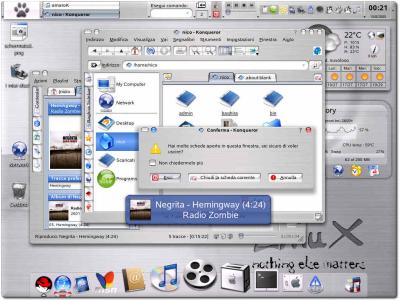Inconvenient Truth Promo
You can obtain many long fragments of the full film from video sites such as YouTube.
You can obtain many long fragments of the full film from video sites such as YouTube.
 EREMY Allison of Samba Fame has recently left Novell in protest over the company’s deal with Microsoft. BoycottNovell has had an interview with Jeremy—one that covers the events which preceded the deal, as well as ways forward. From the interview: ‘My guess is that the negotiations for the useful parts of the agreement (the virtualization part and the federated directory interoperability part) had, as Ron (Hovsepian) says, been going on for months and just before Novell wanted to seal the deal Microsoft turned up with “there’s just this one more thing we want you to sign…” and in desperation to get the other parts of the deal done they rushed it through.’
EREMY Allison of Samba Fame has recently left Novell in protest over the company’s deal with Microsoft. BoycottNovell has had an interview with Jeremy—one that covers the events which preceded the deal, as well as ways forward. From the interview: ‘My guess is that the negotiations for the useful parts of the agreement (the virtualization part and the federated directory interoperability part) had, as Ron (Hovsepian) says, been going on for months and just before Novell wanted to seal the deal Microsoft turned up with “there’s just this one more thing we want you to sign…” and in desperation to get the other parts of the deal done they rushed it through.’
 I enjoyed my E-mail exchange with Jeremy, who I must add has a wonderful personality. Like many of us, he appears to be a freedom enthusiast/fanatic facing a scientific chasm and a world where nothing at all is free.
I enjoyed my E-mail exchange with Jeremy, who I must add has a wonderful personality. Like many of us, he appears to be a freedom enthusiast/fanatic facing a scientific chasm and a world where nothing at all is free.
This interview got Slashdotted and, although it was not my first time being Slashdotted, this was my first time a submission of mine was accepted. I only tired a handful of time in the past (first attempt almost 2 years ago). I guess I’m not longer confined by the cushy space of Digg and Netscape after all…
The environment, and global warming in particular, is becoming a hot topic (pun) these days.
Some of the report was quoted in the Fourth Assessment Report “Climate Change 2007″ by the Intergovernmental Panel on Climate Change, established by the World Meteorological Organization and the United Nations Environment Programme, said Qin.
Meanwhile we hear about a glacier the size of 11,000 football fields breaking and drifting, possibly about to thaw. A new initiative speaks about labelling of energy-efficient servers, but it won’t be enough. We’re running out of time while islands are sinking under the rising sea level. We need a more radical approach. We need a solution now.
 have used Ubuntu for about a year, at work. Even though I don’t use it anymore, I’d certainly recommend it. I am saddened to see that many people resent Ubuntu. Even some avid Linux users seem to raise a brow and associate Ubuntu with newbies and moochers. Perhaps its because of its popularity, which sometimes helps obscure the role of GNU and the Linux kernel, especially with people who are informed w.r.t. key background yet happily hop on the Linux bandwagon. That snobbery and resentment could also be attributed to the flocking of some long-time Linux users, who are dazzled by this exciting branch of Debian.
have used Ubuntu for about a year, at work. Even though I don’t use it anymore, I’d certainly recommend it. I am saddened to see that many people resent Ubuntu. Even some avid Linux users seem to raise a brow and associate Ubuntu with newbies and moochers. Perhaps its because of its popularity, which sometimes helps obscure the role of GNU and the Linux kernel, especially with people who are informed w.r.t. key background yet happily hop on the Linux bandwagon. That snobbery and resentment could also be attributed to the flocking of some long-time Linux users, who are dazzled by this exciting branch of Debian.
It’s amazing how many hungry hounds are barking are out there, either complaining about the ‘Ubuntification’ of Linux or about Linux, as a disruptive technology, in general, having never used even it. But not to worry, GNU/Linux is most definitely taking over, albeit gradually. No disruptive technology could be accepted without resistance, not even cars.
As for ‘Ubuntification’, who cares? People can use any distro once they hop aboard the Linux bandwagon. It’s open. It’s interoperable. The customer, not the vendor is in charge, so one can dance between products at will, or even fork.
If Ubuntu users don’t associate Linux with Ubuntu, that’s fine too. It shows that Ubuntu is not chosen for ideological reasons. In fact, I am rather surprised that many Linux users (especially newcomers) think that Linux is just about freedom (cost), not Freedom (as in control independence, involvement, et cetera). We’ll see more of the latter as ‘Trusted’ Computing, DRM and spying begin their rise, much to humanity’s misfortune. You can either escape to Linux before you get shackled, or struggle later on to break the shackles (it’s possible, but it’s harder). It’s no coincidence either. Products such as Vista and Office 2007 are carefully architectured to master and implement the art of lockins and vendor control over the customer, which essentially raises exit barriers/cost.
Can Microsoft do anything to reverse this trend and further delay the inevitable? Can it stop a community rather than defeat or buy a company (e.g. Novell)? It’s highly improbable. Google is where the talent and passion resides. Microsoft (marketers and lawyers) is the past, not the future (innovation). Same with OpenXML and ODF.


Never underestimate the forces of nature, geology, and climate. Picture from the BBC (2004).
 HE article “Disappearing world: Global warming claims tropical island” caught my eye during Christmas (or “holiday period”, if you prefer). As a reminder, there are/were serious floods that cost lives over Christmas—a trend that seems repeatable, especially around Christmas time. This year was no exception. But what happens when a once-vibrant island becomes an underwater site for diver historians? What will the impact of refuge be? Can man battle climate? Does the world intend to take action at all? Or, as my father would say, is it just “busy making money”?
HE article “Disappearing world: Global warming claims tropical island” caught my eye during Christmas (or “holiday period”, if you prefer). As a reminder, there are/were serious floods that cost lives over Christmas—a trend that seems repeatable, especially around Christmas time. This year was no exception. But what happens when a once-vibrant island becomes an underwater site for diver historians? What will the impact of refuge be? Can man battle climate? Does the world intend to take action at all? Or, as my father would say, is it just “busy making money”?
Rising seas, caused by global warming, have for the first time washed an inhabited island off the face of the Earth. The obliteration of Lohachara island, in India’s part of the Sundarbans where the Ganges and the Brahmaputra rivers empty into the Bay of Bengal, marks the moment when one of the most apocalyptic predictions of environmentalists and climate scientists has started coming true.

Season of the playful penguins from Oyonale
Sidling with Open Source software development is sidling with science. To use a parable, people in conferences don’t just show the end products. They often have papers explaining methods, without being restricited by patents, and increasingly some source code is available too. They want to make a difference, not (necessarily just) money.
Linux (and Open Source software) protects its users, which it does not perceive as customer, from technology that only benefits greedy companies. Avoidance of brainwash, abuse and abomination is not only an important factor to so-called technocrats. As more people grasp the value of liberty, accentuated by corporate-centirc products such as Vista, the stampede to vendor-neutral solutions will begin.

Linux with KDE in its Baghira glory
 ncreasingly, people choose to customise their GNU/Linux installation so that it mimics Mac OS X. Just have a look at this screenshot to get a taste of one recent example. But is that what it all comes down to? Are looks all that matters? Can it steal customers?
ncreasingly, people choose to customise their GNU/Linux installation so that it mimics Mac OS X. Just have a look at this screenshot to get a taste of one recent example. But is that what it all comes down to? Are looks all that matters? Can it steal customers?
Businesses need brains for productivity, not eye candy for play. This applies not only to the server room and the office. Package management in, e.g. Ubuntu GNU/Linux, is simpler than that which is found in Mac OS X. Cost and endless hardware support is yet another matter. Linux supports merely every architecture and, provided you do not buy Windows-only/exclusive peripherals (or Winmodems), Linux will handle everything without a hardware refresh cycle.
The notion of “appealing” is not synonymous with merits. It’s more related to superficial instincts which will not ensure and excitement that won’t last for long. I personally disable all shadows, translucency and I have no interest in eye candy (e.g. Compiz/Beryl with XGL/AIGLX) that detracts and distracts. Show-ware for the show room; but it’s not long-lasting.
Retrieval statistics: 18 queries taking a total of 0.144 seconds • Please report low bandwidth using the feedback form
Original styles created by Ian Main (all acknowledgements) • PHP scripts and styles later modified by Roy Schestowitz • Help yourself to a GPL'd copy
|— Proudly powered by W o r d P r e s s — based on a heavily-hacked version 1.2.1 (Mingus) installation —|